How Twitter changed the world, hashtag-by-hashtag
- Published
Twitter is about to become the most expensive watercooler in history.
After coming onto the scene in 2006 - and with a couple of years to warm up a bit - the site has cemented itself as the home of live, global chatter.
Our timeline highlights the key moments in Twitter's development, and we explore how hashtags have changed the way we communicate.
-
×
-
March 2006
×Twitter's co-founder Jack Dorsey posts the first tweet: "just setting up my twttr". The service was initially developed as a messaging system for Odeo, a now defunct podcast product.
-
August 2007
×Designer Chris Messina becomes the first person to use a hashtag on Twitter. "how do you feel about using # for group. As in #barcamp msg?" he asked others.
-
June 2008
×Nasa announces the discovery of ice on Mars via a tweet from its @MarsPhoenix account. "Best day ever!!" it declares.
-
April 2009
×Actor Ashton Kutcher beats CNN and Britney Spears to become the first account owner to have more than one million followers.
-
May 2009
×The White House sends its first tweet. Barack Obama had already sent his first tweet using his @BarackObama account in April 2007.
-
January 2010
×Paul Chambers posts a joke to Twitter about blowing up Robin Hood Airport in Doncaster. He was arrested and found guilty of sending a "menacing electronic communication" before successfully appealing the conviction.
-
December 2012
×Pope Benedict XVI becomes the first pontiff to send a tweet. His successor, Pope Francis, has since taken over the @Pontifex account.
-
March 2006
×Twitter's co-founder Jack Dorsey posts the first tweet: "just setting up my twttr". The service was initially developed as a messaging system for Odeo, a now defunct podcast product.
-
July 2006
×Twttr is opened up to the public. Techcrunch describes it as a "sort of group send SMS application" and suggests users will object to the idea of having their messages placed on a public website.
-
November 2006
×The service, now named Twitter, announces new features that will prove crucial to its success. These include a facility to send direct messages to users identified as friends, the addition of date timestamps and the ability to delete messages.
-
March 2007
×Twitter wins the Blog category at South by Southwest's Web Awards, but misses out on the US festival's big prizes. Despite this, publicity generated by screens displaying live tweets at the event generate buzz and press coverage.
-
July 2007
×First venture capital investment into Twitter as a stand-alone business. The sum was not disclosed, but reports suggest Union Square Ventures and Charles River Ventures injected $5.7m (£3.6m).
-
March 2008
×Gordon Brown becomes one of the first global leaders to have an official Twitter account: @downingstreet By coincidence Lady Gaga posts her first tweet the same day.
-
October 2008
×Jack Dorsey is ousted as Twitter's chief executive. Another co-founder, Evan Williams, takes on the role. Mr Dorsey stays on as chairman but is no longer an employee. He goes on to set up another business, the app payment service Square.
-
September 2009
×Twitter raises $100m in funds from the bank Morgan Stanley and other investors.The company is valued as being worth $1bn.
-
April 2010
×Promoted Tweets are announced. Red Bull and Starbucks are among the first firms to pay to have ad-branded tweets appear at the top of certain users' search results.
-
October 2010
×Dick Costolo succeeds Evan Williams as Twitter's chief executive. Mr Costolo had been briefly fired from the firm just weeks before.
-
September 2011
×Broadcaster Sky becomes the first brand to post a UK-targeted ad promoting the TV series Glee.
-
December 2011
×Saudi Prince Alwaleed bin Talal takes a $300m stake in Twitter. The firm is now valued at more than $10bn.
-
November 2012
×The Israeli army and Hamas' military wing tweet details of attacks and make threats against each other prompting a debate about the use of Twitter as a propaganda tool.
-
January 2013
×Twitter launches Vine, a service which allows videos lasting up to six seconds to be shared.
-
April 2013
×Hackers post a tweet to the account of Associated Press claiming President Obama has been injured in an explosion at the White House. The news causes the Dow Jones share index to briefly fall.
-
September 2013
×Twitter announces it has filed papers with US regulators to list its shares on a local stock market. When Twitter releases its share sale documents to the public in October, it reveals the company made a $69m (£43m) net loss over the first six months of 2013 on revenue totalling $254m.
Hashtag revolution
To some, it will forever be a fad. A place to tell the world what you've had for lunch.
Yet though its user base is dwarfed by Facebook, no social network has quite the influence of Twitter.
So, what better way to assess its impact than with one of its strongest conventions - the hashtag.
Before Twitter, the # key was little more than something found on telephones to denote "number".
Now hashtags are now the definitive way to group tweets on the same subject.
Here, hashtag-by-hashtag, is a selection of other ways Twitter has changed the world.
#Business

This t-shirt, sold by Topman, was taken off sale after a Twitterstorm
Send a letter of complaint, wait 28 days, get fobbed off, feel oh so alone.
That was the old way, but now we can whinge, in real time, at companies if they're not up to scratch - and firms live in fear of a complaint going viral.
Press offices around the world dread a Twitterstorm, a wave of negative tweets, that can deeply embarrass a firm.
It can be a remarkably effective way of making a company change its policy.
Whether it's getting rid of offensive t-shirts, external, or forcing "gay best friend" dolls to be removed, external, there's no faster way for consumers to well and truly kick off.
Meanwhile, on the financial markets, many have started using social media to predict the future value of businesses.
By analysing the "firehose" (that is, all the tweets from everyone), researchers say they can make an educated guess over how stocks may perform - sometimes up to six days in advance.
#Politics
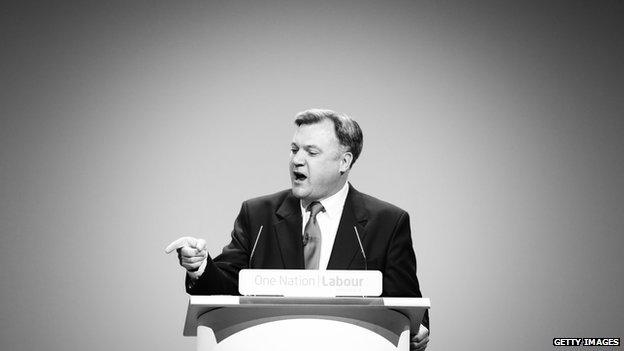
Ed Balls has gone down in history after a tweet - but not intentionally
British prime minister David Cameron famously dismissed Twitter four years ago, with a word unrepeatable on these pages, external.
But since then he's joined the service, as have most leading politicians.
Twitter has cemented itself as a digital soapbox, and a place for politicians to engage directly with people - making major announcements along the way.
Social media - not just Twitter - is so important to politics that ahead of his re-election, US president Barack Obama hired a specialist team dedicated to analysing tweets and status updates across America.
When he won over Republican rival Mitt Romney, it was this tweet of President Obama hugging his wife, external that broke records as the most retweeted ever.
Another oft-retweeted classic came via shadow chancellor Ed Balls who, while trying to search for mentions of himself, accidentally tweeted, simply: "Ed Balls", external. Now, every year, thousands come together to mark the event by celebrating Ed Balls Day, a nationwide in-joke that the MP describes as "baffling".
Twitter can't win elections on its own, of course, but it is arguably one of the most effective campaign tools - particularly in reaching voters that are unlikely to pay attention to a party political broadcast.
But there is scope for abuse. The temptation for political movements to "astroturf" - paying people to support a cause as if they were a genuine devotee - is expected to rise as social media becomes ever more powerful.
#BreakingNews
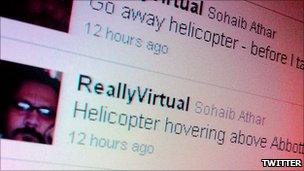
Sohaib Athar said he was using Twitter in Abbottabad - where Osama Bin Laden was found
There's no denying it: the biggest news often breaks first on Twitter.
Be it a tweet about the raid that discovered Osama Bin Laden, or a plane on the Hudson River, external, tweets are regularly the starting point for news stories - even if, as is often the case, the story is about a celebrity's bum.
Newsrooms the world over have taken to social media, using it as both a source, but also a broadcast platform. Newsrooms are awash with positions that simply didn't exist five years ago.
In fact, social media has become so important to journalists that sometimes they need to be reminded not to give stories away. "Always pass breaking news lines to the news desk before posting them on social media networks," read one email from editors at Sky News to their staff, external.
The real challenge, of course, is to make sure what is tweeted is in fact true - and news organisations don't always get it right.
Everything from doctored photographs to fake accounts can cause havoc if not properly verified. One famous example involved Wendi Deng, former wife of Rupert Murdoch, who was cited by many sources as saying various things on Twitter - despite the fact it wasn't actually her.
Twitter also has a habit of killing people off. Hugh Hefner, Jon Bon Jovi and Morgan Freeman have all met their grisly ends on Twitter, only to rise from the dead not long after.
Actor Jeff Goldblum has had the worst of it - rumours of his death reached such a level that he was compelled to appear on American television to cheerfully deliver his own eulogy.
"No one will miss Jeff Goldblum more than me," he said. "He was not only a friend and a mentor, but he was also... me."
#Sport
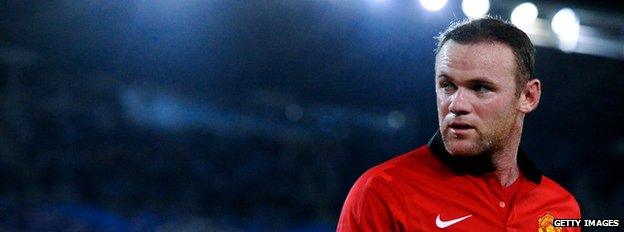
Wayne Rooney tweets a lot about his life, including gruesome head injuries
It would be cruel, but not without some merit, to suggest that a large number of footballers are better seen and not heard.
Nevertheless, in the English Premier League (#EPL), all 20 clubs are now on Twitter, with more than half of all first-team players having verified accounts.
It means that fans are closer than ever to their heroes. Too close, you may wonder, when you see a tweet from Manchester United and England striker Wayne Rooney about his new hair ("Mane United," harked The Sun, external). Or another sharing a great big hole in his head, external.
Still, while fans and journalists alike have lapped up this new direct access, it's not been all good news for footballers: many have fallen foul of what they've tweeted, including Rooney, who got a telling off after tweeting about Nike, external without making clear it was a paid advertisement. Others have been fined by their clubs and the Football Association for careless tweets.
It's sporting events which bring people together on Twitter like none other. Take Andy Murray's Wimbledon win, for instance: 3.4 million tweets about it in less than 12 hours. Ace.
#Celebrity
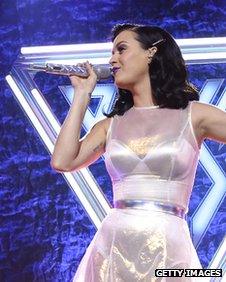
Singer Katy Perry is now the most popular user on Twitter
The first Twitter user to reach a million followers was US actor Ashton Kutcher, back in April 2009.
At the time of writing, it's singer Katy Perry who is the site's most popular user, with more than 46,700,000 followers.
The point here is that celebrities on Twitter are huge, and can perhaps be credited with bringing a more mainstream audience to the service.
In one decidedly non-scientific study of so-called influence, external, it was celebs - mainly members of boyband One Direction - that were considered the most influential of all on the platform - more so than world leaders.
For the A-listers, maintaining such large followings has its downsides - many big-name celebs are often forced to hire teams to tweet on their behalf.
To the delight of tabloid newspapers the world over, celebrities often deliver front pages thanks to Twitter, such as comedian Jason Manford, who quit his job presenting The One Show after he used the service to send "inappropriate" private messages to female fans.
#Activism
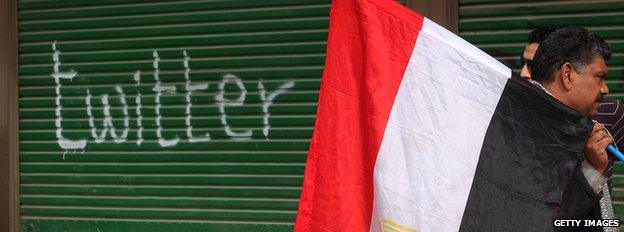
Twitter was used as a key channel for Egyptian protestors during the uprising
Since 2012, Laura Bates - a feminist writer who lives in London - has run the Everyday Sexism, external project, an attempt to log instances of sexist behaviour in normal day-to-day life.
Her movement was the driving force behind a successful campaign to get Facebook to remove pages on its network that made jokes around themes of sexual violence. It was on Twitter that followers of Laura's account were able to target some of Facebook's biggest advertising clients, such as Dove and American Express.
Other campaigns have been waged against cyberbullying, a recurring problem for Twitter. Earlier this year, several prominent women received bomb threats and other violent abuse for speaking out against some attitudes online.
The actual impact of social media protests - be it on Facebook, Twitter or otherwise - is open to interpretation. In an essay for The Atlantic, external, Twitter co-creator Biz Stone likened its contribution to activism as being like a flock of birds - no set leader, but still a powerful, nimble group.
He also talked about the use of Twitter in China, which despite being blocked, is accessed by activists in the country via proxy networks and other government-evading techniques.
During the Egyptian uprisings, Twitter was a key channel for protestors to disseminate material, and to also organise gatherings.
#TheArts

Twitter has been used to bring the work of Samuel Pepys to a new audience
When the Royal Shakespeare Company announced that it was using Twitter to put out a production of Romeo and Juliet, one culture writer at the Guardian said she sympathised with anyone whose heart sank, external; deflated that a organisation built upon the flowing prose of Shakespeare was now crowbarring the same play into 140-character-sized chunks.
Of Twitter, AL Kennedy wrote: "It seems to represent the worst of the boiled-down, sound-bitten, gadget-ridden, contentless, dehumanised, celebrity-obsessed swamp we seem condemned to inhabit."
But, she then admitted, she tweets. Why? Because Twitter and the Arts are seemingly perfect bedfellows: be it for publicising and discussing great works, or even creating new ones.
Twitter has made consuming the arts a shared experience.
Television executives the world over are implementing ways to make the most of the "second screen" - your mobile or tablet - while watching their content. Often this is being seen as a way to fling more adverts at you.
Some worry that the format lends itself to dumbing down - but it could be argued that accounts such as @samuelpepys, external, which tweets the diarist's words, bring classic and important works to new audiences.
Satire, another vital part of society's wellbeing, thrives on social media. The best even get their own book deals - such as @CherylKerl, external and @Queen_UK, external.
#Law
If you have to explain a joke, it ceases to be funny. And if you're Paul Chambers, it also sets off a lengthy court case and means you lose your job.
His tweet, in which he joked he'd blow an airport "sky high" if it didn't reopen in time for him to get a flight, saw him in court after police said he had sent a "menacing electronic communication".
More than two years later, he had a conviction overturned after an appeal - gaining support from various high profile celebrities, including actor Stephen Fry.
Many argued that #TwitterJokeTrial - as it became known - was an example of outdated laws being applied to new and evolving communication platforms.
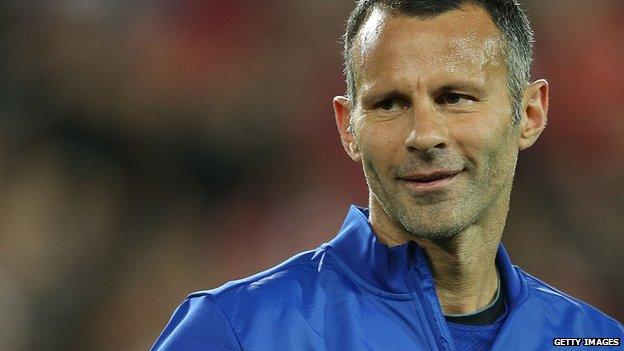
Ryan Giggs was named in parliament - despite an injunction being granted to stop discussion in the press
Also causing legal headaches in the Twitter-age is the increasing fallibility of the injunction - a legal method of keeping something, for a variety of reasons, out of the press.
In times past, injunctions would be granted by judges, forbidding the press to report whatever information it covered, and that would be that. But now, anyone can go on Twitter and break it - and once the information is out there, it's very hard to put a lid on things.
The footballer, who had had an affair with glamour model Imogen Thomas, had obtained an injunction against mentioning him in the press. Unfortunately for him, the Twittersphere had other ideas - tweeting his name with no regard for the law.
What followed was something of a farce - newspapers were gagged from reporting his name, despite thousands talking about it online.
Lib Dem MP John Hemming eventually rendered the injunction useless by naming Mr Giggs in the House of Commons, an action protected by parliamentary privilege.
Mr Hemming was called irresponsible by some, while others argued that it was an exercise in common sense.
The law, meanwhile, has yet to catch up.
Follow Dave Lee on Twitter @DaveLeeBBC, external
- Published6 November 2013
- Published6 November 2013
- Published7 November 2013
